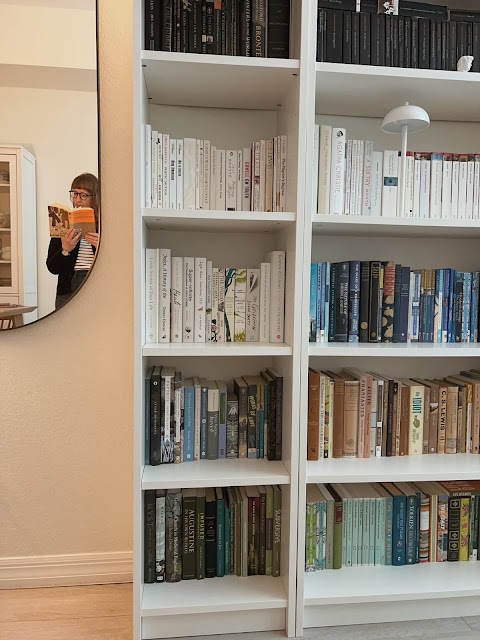It is a cosy morning, replete with soft lighting subdued with some early clouds and calm air. Dew is quietly diffused into the air creating a humidity heavy and showcasing the depths of summer. Rain fell early yesterday but not in the evening, so the morning feels thirsty and as the sun parts the clouds the landscape will seek refreshment by the afternoon.
I reach for my book, currently reading Brideshead Revisited by Evelyn Waugh. Re-reading it, in fact, with a new appreciation for the beauty, nostalgia, and journey to redemption of this book. It's more than 11 years since I read it. I know this because I found a plane ticket stub stuck in the back page/cover of the book, for my flight to IN for training in my new job (still my employer today!) in March 2013. I know I did not fully appreciate this book back then. I was not nearly as deep or attentive of a reader back then to understand the nuances of this novel.
This book is deeply nostalgic, set between the two world wars, mostly taking place in Oxford and London, setting us up from the very beginning with the mature Charles Ryder falling upon an estate whilst camping with his troops in the countryside, and suddenly when he hears the name of the estate "Brideshead":
...an immense silence followed, empty at first, but gradually, as my outraged sense regained authority, full of a multitude of sweet and natural and long-forgotten sounds - for he had spoken a name that was so familiar to me, a conjuror's name of such ancient power, that, at its mere sound, the phantoms of those haunted late years began to take flight.
And there follows this journey back to Charles's young college life at Oxford, still a city in "aquatint" in those early lightweight days before deep trials came through his associations with the Marchmain, an English aristocratic, family. Through the years of some painful growth he encounters episodes of grace and conversion, he encounters the culture shifting and faces the ultimate decisions of choosing faith over the depravity of a sinful life.
The writing is exquisite in this book. From reading some of Evelyn's biography, he must have drawn from some of his own youthful Oxford experiences for the story of Charles, and the lovable, yet facing inner demons, character of Sebastian. This kind of book, I feel, could not be written today with such beautiful and harrowing encounters of life in between the world wars, unless someone had lived through such a time. One cannot imagine exactly how the culture shifting (deep growing secularism and dismissal of Catholics until a later time) would have impacted someone living in that time, facing the secular and religious clashes unless one had seen that unfold. What we see now is different, naturally, our world is different, so getting a glimpse of this life in the 1920's, 1930's is thought provoking and insightful. How is it different from now? Is there more or less freedom? These are questions we can ask as a modern reader.
He led me through a baize door into a dark corridor; I could dimly see a gilt cornice and vaulted plaster above; then, opening a heavy, smooth-swinging mahogany door, he led me into a darkened hall. Light streamed through he cracks in the shutters. Sebastian unbarred one, and folded it back; the mellow afternoon sun flooded in, over the bare floor, the vast, twin fireplaces of sculptured marble, the coved ceiling frescoed with classic deities and heroes, the gilt mirrors and scagliola pilasters, the islands of sheeted furniture. It was a glimpse only, such as might be had from the top of an omnibus into a lighted ballroom; then Sebastian quickly shut out the sun. "You see," he said; "it's like this."
This is what occurs through the book, of Charles telling his story, looking back. There arises a glimpse here and there, of something more, something trying to break into his life as he encounters the Marchmain family and their Catholic faith, for years he resists these glimpses and pushes them off, but when events take a turn, even if still not wanting to be folded in for the deep reasons, he kneels and prays. If motivation is at first in the direction of Julia, he begins to understand it is actually for something much deeper and more fulfilling, it is true belief.
Things may not end in the worldly happy sense, and yet, the turning toward God, for both Julia and Charles, is the best of all possible endings, with their gazes directed toward God as their ultimate source of all they need. Leaving their own desires for God's.
I found it this morning, burning anew among the old stones.

No comments:
Post a Comment